JOB VACANCIES AT THE SOUTH AFRICAN EMBASSY
The Embassy is hiring 1 Receptionist and 1 Cleaner.
Please see below for more details:
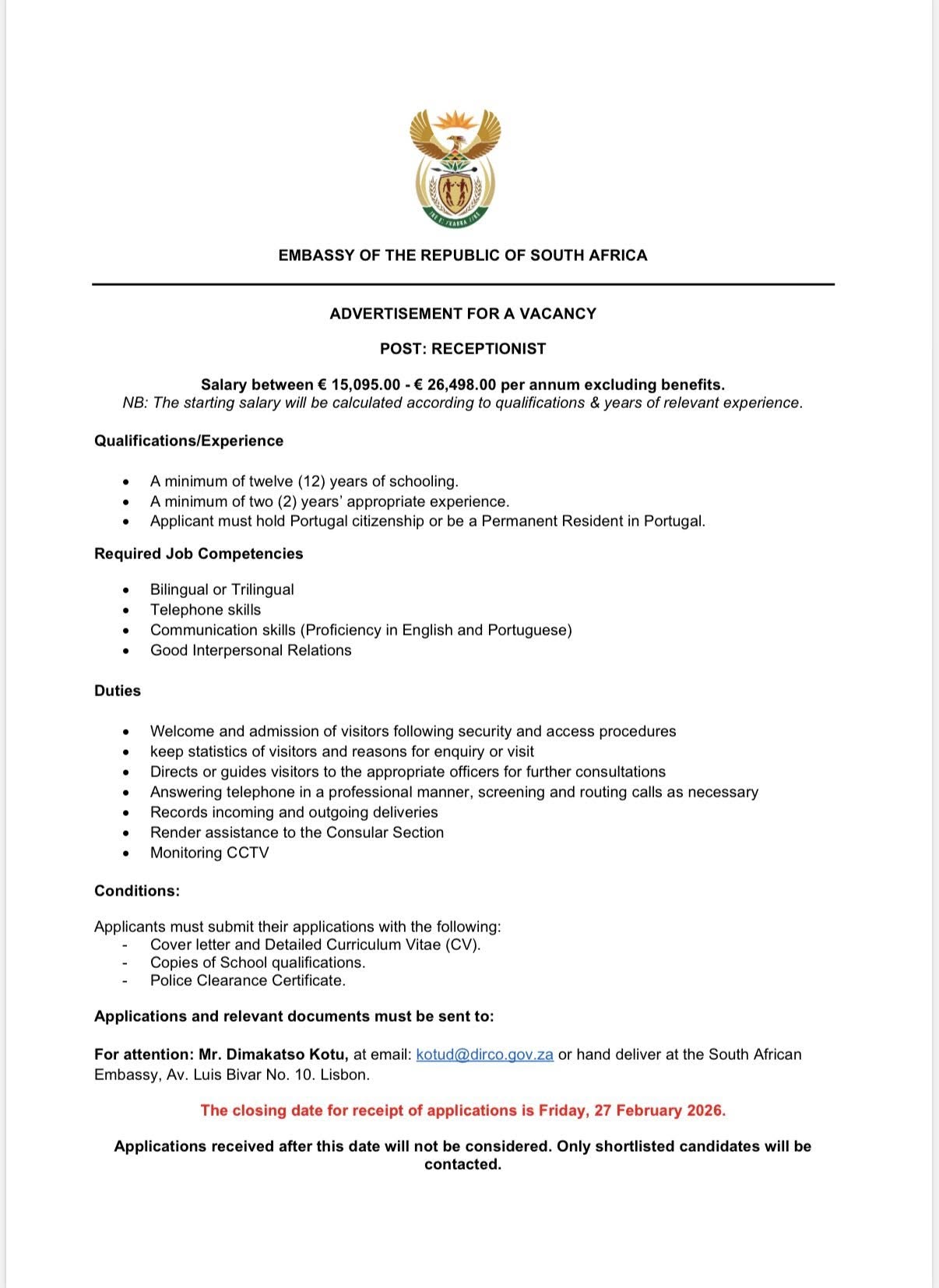
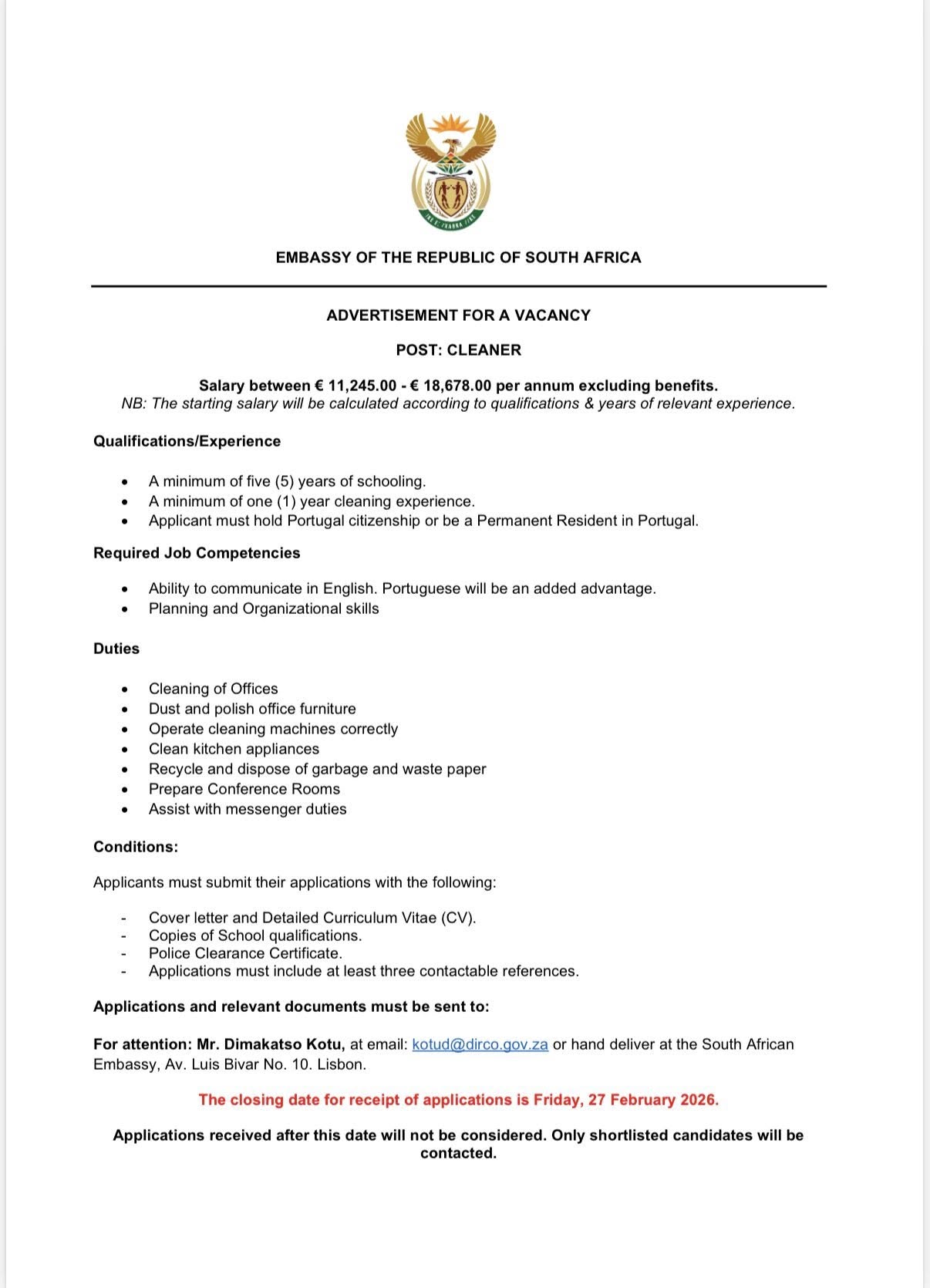
The Embassy is hiring 1 Receptionist and 1 Cleaner.
Please see below for more details:


Please be informed that the Embassy will be closed over the Christmas holidays from 10H00 am on 24 December 2025 and reopens on 5 January 2026.
For emergencies only please call 964 151 989.
Please be informed that the Embassy's landline (T: 213 192 200) is temporarily out of order.
To contact the Embassy, please call 964 151 989 until further notice.
Thank you.
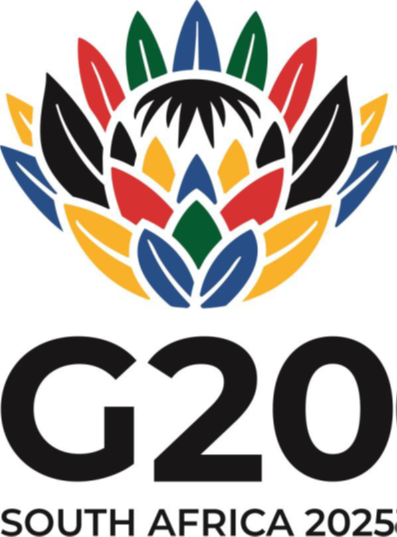
South Africa officially took over the Presidency of the Group of Twenty (G20) on 1 December 2024 from Brazil and holds the G20 Presidency until 30 November 2025 under the theme: “Solidarity, Equality, Sustainability”.
Solidarity requires that all nations work together, particularly during difficult times, be it an economic crisis, natural disaster, or pandemic. In an interconnected world, where the challenges faced by one nation affect all nations, solidarity is more important than ever.
By promoting Equality, we strive to ensure fair treatment and equal opportunities for all individuals and nations. We aim to break down divisions of economic status, gender, race, geography or any other characteristics. The disparities in wealth and development within and between countries is unjust and unsustainable.
Sustainability means using our resources—like water, energy, and land—in a smart way that does not harm the planet or compromise the ability of future generations to meet their own needs. We are seeking to strengthen and advance the international effort to achieve the Sustainable Development Goals by 2030.
The G20 comprises many of the world's largest developing and developed economies, It was established to tackle pressing global economic and financial issues. Decisions taken by the G20 have a direct impact on the lives of all members of the global community.
South Africa’s G20 Presidency will culminate in the hosting of the G20 Leaders’ Summit on 22 and 23 November 2025 in Johannesburg. This will be the first time an African country hosts such a prestigious gathering, which brings together global leaders and policymakers from major economies to discuss global economic stability, sustainable growth and development, The G20 has in recent years expanded its agenda to include some of the most challenges of our time, including around climate change, trade, debt, health, agriculture, food and energy security, natural disasters and anti-corruption.
The G20 Presidency has provided South Africa with an opportunity to ensure that the development priorities of the Global South, and Africa especially, find expression firmly, onto the agenda of the G20.
To read the Ubuntu News Flash, please click HERE. Highlights include:
MINISTER MAROPENE RAMOKGOPA LEADS SOUTH AFRICA DELEGATION AT G7 DEVELOPMENT MINISTERS’ MEETING (FOR TODAY PLEASE!!
SOUTH AFRICA CLINCHES WORLD FUTURE POLICY AWARD
SOUTH AFRICAN VET DR KELSEY SKINNER NOMINATED FOR GOLDEN STAR AWARD
UCT TO BRING THE WORLD ACADEMIC SUMMIT TO AFRICA FOR THE FIRST TIME
CAPE TOWN’S KITE FEST TURNS SKIES INTO GLOBAL MAGNET
From 12 October 2025, the European Union (EU) has introduced the EU Entry – Exit System (EES), for travellers entering the EU.
What is the EES?
The EES is the EU’s new border management system and will change the way that the EU manages its external borders.
The EES will digitalize the borders of EU countries and is designed to record data of visa exempt and visa required non-EU nationals, travelling for a short stay (no more than 90 days in any 180 day period), each time they cross the external borders of the 29 Schengen Member States.
The following data will be recorded in the EES file: data listed in travel document (full name, date of birth, nationality), date and place of each entry and exit, biometric data such as facial image and fingerprints, refusal of entry.
Please note that the EES will be deployed progressively in European countries that will introduce the different elements of the EES in phases, including the collection of biometric data, such as facial image and fingerprints. For international travellers this means that their biometric data (facial image and fingerprints) might not be collected at every border crossing point right away, and their personal information may not be registered in the system. Passports will continue to be stamped as usual. This progressive implementation will last until 9 April 2026. The EES will be fully operational from 10 April 2026, and the stamping of passports will be replaced with electronic records in the system.
Information pertaining to Dual- Nationals
The EES applies to non-EU nationals. The data of EU nationals will not be registered in the EES.
Dual nationals holding at least one EU nationality should use the travel document issued by the respective EU Member State.
In case dual nationals do not carry with them EU travel documents, they will need to show other documents to the border authorities to prove their nationality.
Benefits of the EES.
For more information see link to official page below:
Please be informed that this year's Diplomatic Bazaar will take place at the Centro de Congressos de Lisboa (old FIL), on 14-15 November, from 11H00 to 19H00.
There is a 2 Euro entry fee.
All proceeds go to institutions that assist the homeless.
Com and join us! Come and support a good casue!
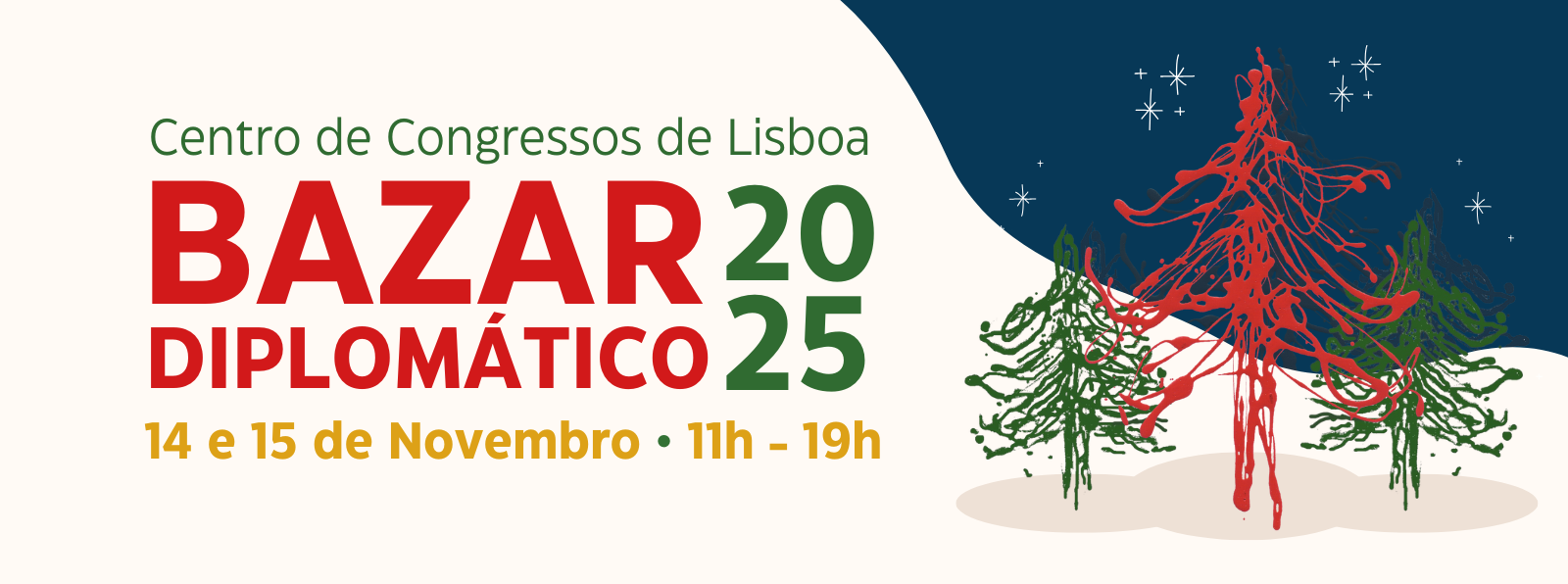
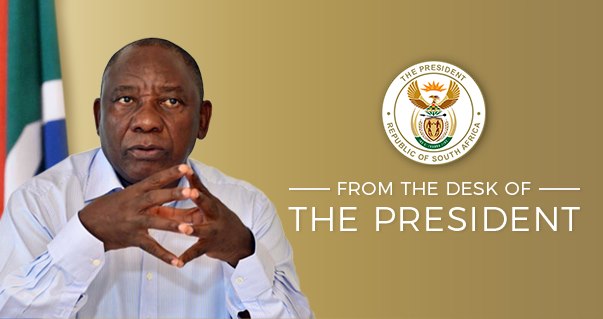
The UN is humanity‘s best chance at peace and development
Dear Fellow South African,
This week we will be attending the 80th session of the United Nations General Assembly in New York. It is taking place at a time when the global rules-based system is profoundly fragile.
Eighty years since the UN Charter committed countries of the world to work together to advance peace, promote development and uphold the rules of international justice and protect human rights, the UN is under increasing scrutiny.
According to the UN’s own data, the number of global conflicts are at the highest levels since the end of the Second World War. Nearly half of the world’s 1.1 billion population who live in acute poverty are in countries wracked by violent conflict.
Global health and pandemic response and preparedness is under serious threat following the withdrawal of global health financing and aid.
Although last year was the warmest year on record, the global climate response is faltering. Current climate action and country ambition is failing to prevent global warming.
As the UN General Assembly convenes this week under the theme “Accelerating Global Progress Through Intergenerational Collaboration” the stakes have never been higher.
The UN is struggling to meet its mandate as contained in the UN Charter. It continues to be hampered by competing national interests that impede collective action. There is a lack of political will among member states to address many challenges, including the chronic underfunding of peacekeeping operations.
But by far the most serious hindrance to the UN fulfilling its mandate is the structure and operation of the UN Security Council. Despite changes in global power relations over more than half a century, the decision making architecture that has enabled the five permanent members to have veto powers has not changed since the end of the Second World War. These five permanent members effectively make decisions on behalf of more than 85% of the world’s population living in countries of the Global South. They continue to use their veto powers to effectively paralyse collective action and prevent timely responses to crises, even in the face of clear violations of international law.
South Africa has been consistent in its calls for UN Security Council reform and for it to better reflect global realities. The current composition of the UN Security Council and its record of decisions seriously undermine the spirit of global cooperation and weaken the UN’s commitment to neutrality and its legitimacy.
Efforts at reform, such as proposals to expand the permanent membership of the Security Council, improving regional representation, and restricting the use of the veto, have stalled and must be reinvigorated with urgency.
At a time of widespread poverty and underdevelopment, when human rights are under threat worldwide and where geopolitical tensions are creating instability across the globe, advancing multilateralism is more critical than ever.
If the global, rules-based system is to have practical meaning, the UN must exercise its leadership role of global governance. The UN must actively enforce international law and human rights standards for all, and not the select few.
The message South Africa takes to this year’s General Assembly is that if the organisation is to remain relevant and if the global, rules-based system is to endure, the UN must demonstrate in both word and deed that multilateralism is alive. Despite its many challenges, the UN remains humanity’s best chance at peace, security and sustainable development for all.
With best regards,


The public service and the people need to work together
Dear Fellow South African,
Once a year, in September, South Africa marks Public Service Month, a time to focus on the essential contribution that the country’s 1.7 million public servants make to meeting the needs of the people.
It is through public servants that government provides healthcare, education, policing, social services and countless other essential functions that touch every South African's life. When our public service operates at its best, it is a powerful instrument for social and economic development. When it falters, it is often our most vulnerable citizens who bear the brunt.
There are many dedicated public servants who work tirelessly in service of our nation. We thank them for the work they do to improve the lives of South Africans. But our public service faces significant challenges. These include skills gaps, outdated systems and processes, inconsistent service delivery and corruption. In many parts of the state, the values of Batho Pele – putting people first – have been eroded.
That is why we are strengthening the professional foundations of our public service. Through the reforms underway we are working to attract the right skills, implement rigorous performance management and create career pathways that reward merit and excellence. Through the National School of Government we are investing in training and development.
As we work to build a more professional, accountable and capable public service, we need to bring the public service closer to the people they serve. We must challenge the idea that public servants are providers and citizens are mere beneficiaries of goods and services.
The National Dialogue, which was launched in August, provides an opportunity to change the relationship between public servants and the public.
Over the next few months, South Africans will be meeting as communities across the country. They will be discussing the issues that most concern them and will together be forging a vision to take the country forward. These conversations will culminate in a National Convention next year, which will finalise a social compact that outlines clear actions and responsibilities for all sectors of society.
The thousands of public dialogues taking place across the country will also provide an opportunity for communities to address the immediate challenges that they face where they live. These challenges may include anything from electricity cuts to overcrowded schools, a lack of water provision to poorly maintained roads, or an increase in violent crime or drug use.
Through the National Dialogue process, each community is encouraged to work with all relevant stakeholders – ward councillors, municipal officials, civic bodies, community organisations and provincial and national departments – on a common plan to address these challenges.
By working together in an integrated way, drawing together resources from within and outside the state, these stakeholders can find ways to solve local problems. Public servants have a vital role to play in working towards solutions alongside and in cooperation with communities.
This approach is closely aligned with the District Development Model, which is about bringing government closer to the people and ensuring that local needs inform service delivery priorities.
It is about building a public service that listens to citizens, adapts to their needs and continuously improves its services. Such a public service requires the active participation of citizens as partners in development, growth and transformation.
I call on every South African to hold government accountable, to engage constructively with public institutions and to recognise the vital role that a professional public service plays in building the society we all want.
Together, we can build a public service that serves with excellence and integrity and works with South Africans to realise the promise of a better life for all.
With best regards,
